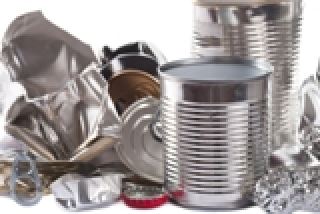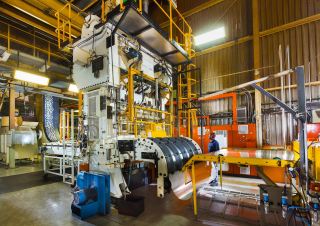MetPac-SA CEO becomes first packaging expert in South Africa to be awarded CPP Designation
Kishan Singh, CEO of MetPac-SA, Global Ambassador of the World Packaging Organisation (WPO) and National Education Officer of the Institute of Packaging SA (IPSA), has become the first packaging expert in South Africa to be awarded the designation “Certified Packaging Professional” (CPP) by the international Institute of Packaging Professionals (IoPP), based in the United States of America.
History of Certified Packaging Professional Designation
Since 1972, the IoPP has been awarding this designation to packaging professionals who have proven themselves to be worthy of the CPP status. To date, however, there are less than 2 500 individuals worldwide who have achieved this coveted CPP status which requires proof of years of experience, an in-depth packaging knowledge, as well as commitment to the global packaging industry. The CPP programme is now also endorsed by WPO and IPSA.
Explains Kishan: "The CPP designation has become the leading mark of excellence internationally and a must-have recognition of industry proficiency and achievement for packaging professionals. I am very pleased about attaining the CPP designation, as it is a commitment to excellence in the global packaging profession as well as an important investment in my professional development.” Kishan is now permitted to use the suffix “CPP” after his name on business cards and letterheads, to wear the IoPP/CPP lapel pin, and to display the CPP Certificate.
Ensuring a globally level playing field
The CPP designation is based on current skills and expertise, and candidates are required to be re-certificated every 3 years as part of a continuous professional development system. The CPP programme ensures that candidates are regularly keeping abreast of current packaging trends, innovations and knowledge and the program ensures that packaging professionals are the same, globally level, playing field.
“The CPP programme helps the international packaging fraternity to better understand the level of knowledge and expertise that you truly have in the packaging field. Being awarded the designation was therefore no easy feat as the criteria that had to be met, were extremely arduous. Amongst other things, I was required to thoroughly demonstrate technical industry expertise and experience, as well as significant contribution towards education, within the global packaging industry, measured through a flexible applicant testing process,” he explains.
Demonstrating command of applied packaging technology
Furthermore, candidates are expected to demonstrate either their command of applied packaging technology by successfully completing a narrative exam or submitting a detailed resume of activities in which they document their past six years of experience and active participation in local and global packaging and/or related disciplines. They also have to complete a 150 question test on packaging supply chain principles, packaging graphics, packaging manufacturing techniques, packaging machinery, materials and technology, of which a minimum of 80% correct score is considered passing.
Promoting the qualification locally
“South Africans wishing to pursue this international academic qualification, will need to contact the Institute of Packaging SA (IPSA) who are now the agents for the WPO endorsed CPP programme managed through the IOPP. I encourage all those that seek to make Packaging their profession, and who wish to be recognised in a vibrant and ever-changing industry to seek this internationally accepted packaging designation. It’s a tough process, but a valuable investment in your career and, through IPSA, I would be happy to offer help and advice to others who are interested in also applying for the CPP designation,” Kishan concludes.
For more information, visit www.iopp.org or www.ipsa.org.za
-- ENDS --
Issued on behalf of MetPac-SA.
For media enquiries, please contact Monique Holtzhausen at Aim Marketing & Communications Consultants.
Tel: (021) 531-0313 Email: This email address is being protected from spambots. You need JavaScript enabled to view it. Cell: (071) 083-5219
METPAC-SA APPOINTS KISHAN SINGH AS NEW CEO
MetPac-SA has appointed packaging guru, Kishan Singh, to take over the helm from Delanie Bezuidenhout as the organisation’s new Chief Executive Officer with effect from the 1st of March 2018.
Educational and career highlights
Kishan is widely known and respected for his in-depth knowledge, technical and commercial expertise within the metals packaging sector. He obtained his BSc degree (majoring in Chemistry and Biochemistry) from the University of Durban Westville in 1987, before completing his Post Graduate qualification in Management Sciences. He then achieved the City and Guilds (Quality Management) through the UK, obtaining distinctions in both the modules.
He recently acquired the Lean Six Sigma Black Belt status through Dr Mikel Harry’s Six Sigma Management Institute USA, and is currently busy with his Masters/PhD degree in Quality Management in South Africa. This degree focuses on practical techniques in ISO9001:2015 Business Systems design that will actually deliver true and measurable financial benefits through process optimisation, rather than the current stagnant methodologies employed over the past 30 years.
He gained valuable hands-on experience as the Quality Manager of Nampak DivFood Mobeni (2003-2016), managing the business across Operations, Quality, Supply Chain, Engineering and Sales, before starting his own Management Consulting and Training company, Global Integrated Business Solutions (Pty) Ltd. They specialise in integrated Business Management Systems as well as the design of Quality Business System Models in support of overall business objectives.
Views on the future of the metals packaging industry
Commenting on his new appointment, Kishan says it is an honour and a privilege to continue serving the metal packaging sector and that he is extremely excited about what the future holds for this industry.
“The rapid growth in global population, accelerated globalisation, rising GDPs, emerging middle classes and a deep awareness of environmental sustainability, have all placed a critical demand on better packaging that is able to support our changing and fast paced lifestyles. Since the early 1800s when the food was canned for the first time by French inventor and confectioner, Nicolas Appert, metal packaging has been a logical and practical packaging solution for a wide range of different applications. Given its demonstrated relatively high recovery rates, metal packaging will most certainly continue to hold its place in the packaging industry in the future. It is able to adapt and accommodate to the requirements of the modern consumer by shape changes, functionality changes, closure changes, and most importantly, by an unwavering industry quest for packaging mass reduction, without compromising packaging efficacy,” Kishan says.
more 2/…new metpac ceo two
Challenges facing the local metals packaging industry
Although the future looks bright, Kishan says he also mindful of the various challenges that need to be overcome.
“The metals industry should not underestimate the threat of losing market share to other packaging materials. We should therefore constantly be on the lookout for ways to innovate and promote the message that metal is truly an environmentally sustainable packaging solution. Spreading the recycling message, news of our industry’s ongoing and impressive metal recovery rates, as well as continual innovation to preserve natural resources, are all critical in proving our extended producer responsibility to the consumer, government and other stake holders,” Kishan explains.
To this end, Kishan will be taking a leading role over the next few months in completing and submitting MetPac-SA’s plan for the Industry Waste Management Plan (IndWMP) by the September 2018 deadline. “This will probably be the single most important initiative that I will be driving in the short-to medium term as the entire packaging industry, through dedicated Producer Responsibility Organisations (PROs), are all currently working together to achieve this deadline,” he says.
Encouraging the metals packaging industry to speak with a united voice
Another key area of focus for him will be increasing membership to MetPac-SA by encouraging raw material suppliers, primary packaging converters, fillers,bottlers as well as brand owners to create a truly unified voice that promotes the benefits of metal packaging and demonstrates manufacturer responsibility on efficient use of raw materials.
“It is vitally important for all the members of the metals packaging value chain to come together, not only as packaging people, but as industrialists, to work in harmony with the planet by creating a true, circular economy. Joining a PRO such as MetPac-SA is not only the right thing to do from an environmental point of view, but it strengthens our hands and our combined efforts to plough back much-needed research, resources and results to create an environmentally responsible, sustainable industry,” Kishan implores.
For more information about MetPac-SA, visit their website on www.metpacsa.org.za or email Kishan Singh directly at This email address is being protected from spambots. You need JavaScript enabled to view it.
Recycling your metals matter
South Africans used more than 198 000 tonnes of metal cans, foil trays and aerosols during 2016 alone. MetPac-SA, the material recovery organisation representing the steel, tinplate and aluminium packaging industries in South Africa, is reminding South Africans that recycling their metals matter to the thousands of schools, collectors and convertors who earn a living from recycling this material.
“Metal packaging is one of the world’s most valuable materials for collectors and recycler. This packaging material continues to be in high demand and can readily be found in and around the home and includes cooldrink cans, food tins (including pet food), foil trays, empty aerosols canisters, metal bottle tops and foil wrap,” says Delanie Bezuidenhout, CEO of Metpac-SA.
According to the latest figures released by Packaging SA, South Africa has an impressive recovery rate for used beverage cans, which currently sits at around 73 % (up from 70 % in 2015) - one of the leaders in the world. For the past 5 years, metals packaging has consistently outperformed glass, paper and plastic by recording the highest recovery rate and diversion from landfill. Whilst South Africans have an already impressive track record when it comes to recycling their metal cans, MetPac-SA is now also appealing to people to think about the quality of their recycling as well as the quantity.
“The metals packaging industry has managed to develop a true circular economy whereby the material that is collected and recycled, is used to produce new products at a far lower cost to the environment than making them from raw materials. Every time metal passes through the recycling loop, the benefits are repeated, again and again and again!” Delanie explains.
Recycling metals matter two Recycling metal packaging helps save valuable and scarce natural resources, energy and greenhouse gas emissions. Twenty recycled cans can be made with the energy needed to produce one new can using primary aluminium ingot. Similarly, recycling one beverage can saves the amount of energy needed to burn a 100w bulb for 4 hours, or to run a TV for four hours.
“It is important to remember that both the quality and quantity of the materials that enter our waste stream impact the value. The cleaner the food or drink can that gets thrown into the recycling bag, the higher the value will be for the collectors and the recyclers. For this reason, we are reminding residents try to clean out their cans as much as possible before recycling it. Because South Africa is a water-scarce country, you should use your used dishwashing-up water and not clean tap water. Every can that is recycled ends up making a big difference in the end,” Delanie concludes.
Recycling aerosols
Ensure that your aerosol canister is completely used up before you put it in the recycling bin.
Do not pierce, crush or flatten aerosols before recycling.
Detach any loose or easily removable parts, such as the plastic lid, and dispose of them with the rest of your rubbish. Don't worry about removing the plastic nozzle - this will be removed during the recycling process.
Recycling foil trays and household foil
Clean aluminium foil can also be recycled, such as wrapping foil, take-away trays, pie and quiche cases and oven-ready meal trays.
Please wipe or rinse food residue off take away and ready meal trays: There’s no need to run the tap, just a quick swill in the bowl at the end of the washing up is usually sufficient.
Recycling non-packaging metal items
All steel and aluminium can be recycled but not all can be collected at the kerbside. You can take electrical items, like irons, or bulky items like bicycles and pans, paint cans and nuts and bolts to your household waste and recycling centre. Visit www.mywaste.co.za to find a recycling centre closest to you.
For more information, visit www.metpac.org.za
ENDS
Issued on behalf of MetPac-SA by Aim Marketing & Communications Consultants.
For media enquiries, please contact Monique Holtzhausen on (071) 083-5219 / (021) 531-0313. Email: This email address is being protected from spambots. You need JavaScript enabled to view it.
Converting from Steel to Aluminium Beverage Cans Bears Fruit for SA's Metals Pacakging and Recycling Industries
More than $94-million (ZAR1.258 billion) in capital investments have been made by industry heavyweights such as ABInbev, Coca-Cola Southern Africa, Nampak Bevcan and Hulamin to convert the beverage can industry from steel to aluminium.
Not only did this step bring the region in line with other major markets such as the United States - which changed to aluminium cans in the 1970s and 1980s – but it also had a major, positive impact on the industry’s recycling statistics.
According to MetPac-SA, the industry body representing the interests of the local metal packaging industry, the recycling rate for used beverage cans in South Africa grew significantly from only 18 % in 1993 to its present rate of around 72%. The organisation’s CEO, Delanie Bezuidenhout, believes that South Africa’s conversion to aluminium played an important role in increasing recycling volumes because aluminium beverage cans are infinitely recyclable without loss of strength or quality, and offer collectors an attractive rate.
“This makes aluminium recovery and recycling an economically-viable option for beverage can collectors in the informal sector. Millions of Rands flows into the scrap metals and recycling industry each year, allowing an additional 2 000 to 3 000 people to earn a living or to supplement low incomes,” Bezuidenhout says.
With a long tradition of continuous improvement and business excellence, Nampak Bevcan has become a preferred beverage can manufacturer in sub-Saharan Africa. With manufacturing plants located in Johannesburg, Pretoria, Cape Town, Angola and Nigeria, Nampak Bevcan commissioned South Africa’s first aluminium beverage can production line at its Springs plant. By end-2014, all of their Gauteng can production lines were being converted to aluminium cans, completing the transition from steel to aluminium cans in just a few years. Initially only two aluminium lines were running, but soon all three lines were operational to meet the demand – allowing the company to produce eight can sizes at maximum speeds of up to 3 000 cans/minute, compared to 1 600 cans/minute on the old tinplate lines.
“The full-scale plant is regarded as one of the biggest aluminium can manufacturing facilities in the world”, says Erik Smuts, Nampak's Group Executive for Bevcan.
Smuts lists the environmental advantages of this conversion process as up to 17% less energy is used in the manufacturing process because, amongst other savings, no external white coating is required, which in turn has reduced the number of ovens needed.
“A melting point of 660°C compared to more than 1 300°C for steel to process and recycle aluminium plus around a 60% weight reduction, which helps to minimise material and transportation costs, results in a significantly improved carbon footprint,” he states. “Thanks to system advances, we’re are also achieving significantly enhanced print quality on aluminium cans at high speeds.”
Hulamin is the sole South African company capable of manufacturing the aluminium sheet that Nampak requires. In past years, almost 95% of Hulamin’s aluminium came in the form of virgin aluminium ingots from BHP Billiton’s Hillside smelter in Richards Bay, KwaZulu-Natal. However, because it takes about 20 times more energy to convert mined bauxite into aluminium than it does to re-melt a used beverage can, Hulamin invested heavily in its recycling operations to take advantage of this energy and production cost savings.
Hulamin recently unveiled a ZAR300-million state-of-the-art, scrap recycling facility built to recycle used aluminium cans – including scrap storage, sorting, cleaning and melting – increasing Hulamin’s onsite closed-loop recycling capability. The company is on its way to sourcing 20% of metal units from recycling.
“Looking at the Brazilian market, which leads global can recycling with a recovery rate of 97.9%, we believe that South Africa can achieve the same successes. In Brazil, no cans go to landfill and the collectors are the most important pillar for this process. To this end, we are working hard on aligning industry roleplayers with our vision to ensure that collectors benefit from an efficient and transparent market. We want to streamline the recycling of aluminium cans in order to ensure that more of the metal’s value will be passed through to collectors. It’s in all of our interests to have as high a recycling rate as possible,” Delanie concludes.
To find out more about MetPac-SA’s objectives and operations, visit www.metpacsa.org.za
Issued on behalf of Metpac-SA by Aim Marketing & Communications Consultants.
For more information, contact Monique Holtzhausen at (021) 531-0313 or (071) 083-5219.
Email: This email address is being protected from spambots. You need JavaScript enabled to view it.




